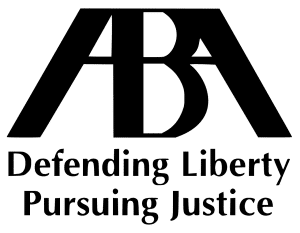Shakespeare’s Macbeth is probably best known for lamenting his wife’s death: “Life’s but a walking shadow, a poor player, that struts and frets his hour upon the stage, and then is heard no more; it is a tale told by an idiot, full of sound and fury, signifying nothing.” The American Bar Association held its annual meeting late last month, with several panels focused on the problems presented by self represented litigants. Not unlike Macbeth’s depressed view of life, there was lots of sound and fury from these panels, and not much signified.
We’re All Gonna Die
A panel entitled Issues of Concern to the Legal Profession was held on the first day of the conference. It featured a series of speakers detailing the measures courts have taken to address the rise in pro se litigation. The moderator, constitutional scholar Phoebe Haddon, noted that the expense of hiring a lawyer had been shown to be less a factor in self-representation than the sense a lawyer wouldn’t be that helpful.
The president of Avvo, the free legal-advice forum, urged lawyers to stop relying on unlicensed practice of law (UPL) statutes to protect them from innovation and to instead partner with innovative firms to serve the huge market of legal consumers. (<– Best advice of the day.)
The top judge in Los Angeles County, the busiest court system in the nation, prescribed a larger menu of legal forms to get cases heard by judges more quickly, especially since half the cases in her court had a self represented litigant. Gregory Coleman, past president of Florida’s bar association, said two million hours of pro bono work donated last year had made no real impact on the logjam of cases in his state.
In contrast, chief justice Barbara Madsen in Washington described that state’s certification program for limited license legal technicians (LLLTs), designed to regulate the non-lawyers who were violating UPL statutes to help people move their cases through the courts. It appears no one addressed the moderator’s point that lawyers were seen as less than helpful. (Oops!)
Tiptoe Through The Tulips
A panel the next day covered the impact of new technologies on the legal profession. Representatives from Avvo, LegalZoom and Neota Logic faced a hostile crowd that wasn’t trying to hear the many ways in which innovation was threatening their careers. John Suh, LegalZoom’s CEO, poured gas on the flames:
If the fundamental mission is democratizing law and increasing access to justice for millions of Americans that can’t afford it, why aren’t we partners? We’re doing the same thing!
Of course there wasn’t a lawyer in the room who would turn down a chance to “partner with” LegalZoom, but that’s not how the company’s outreach to the profession is viewed. (Think ‘peons’.) And what hungry practicing lawyer wants to “democratize” the law? When asked whether all this innovation was designed to replace lawyers, Suh answered:
Technology can help you do the same thing 10,000 times in a row. Having good people can enable you to do the right thing 10,000 times in a row.
I suspect the lawyers were feeling trolled by that point. The best line of the day came from Michigan state bar president Tom Rombach, one of the treacherous lawyers on the panel:
If you don’t see the course of history changing our profession, then you’ll be in the dustbin along with the dinosaurs.
And to think lawyers paid good money to hear this from their own trade organization!
Watch Out For The Crazies
Perhaps the strangest panel was The Unstable Pro Se Litigant: Strategies for Ethically Dealing with the Difficult Unrepresented Litigant, on the dangers of allowing regular people to come into court. The discussion began with the case of Bart Ross, the Illinois cancer patient who murdered a judge’s family and committed suicide ten years ago after she dismissed his medical malpractice claims. A Harvard Medical School psychologist assured the assembled lawyers that not every wacko self represented litigant was violent — whew! that’s a relief — but there were several warning signs to look for. He told those in attendance they might have a problem if an opposing pro se litigant:
- failed to show up for hearings,
- showed up unprepared to argue,
- filed too many motions,
- expressed antagonism toward the judge,
- cried a lot, or
- sought too much attention.
A federal bankruptcy judge said cases with pro se litigants are slow-moving because we care more about getting attention than about losing money, so we’re loathe to settle our cases. One of the panelists, attorney Jadd Masso, likened pro se litigants to the kind of “frightened animal” for which caution was advised. Another federal judge noted the tradeoff between providing access to the courts for the self-represented and ensuring we don’t “run roughshod over the court.”
Perhaps someday the ABA will host a panel on revamping the maze of civil procedures and local court rules that make it difficult for average people to capably represent themselves. You know, something called “access to justice”. That would be signifying something.
Yes, I know it’s too much to ask, but a girl can dream. Share your recommendations for next year’s ABA panels in the comments below.



